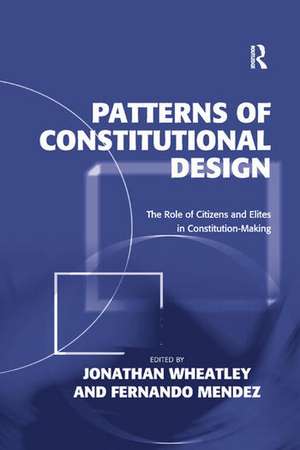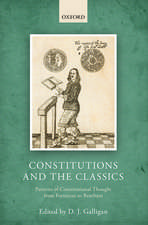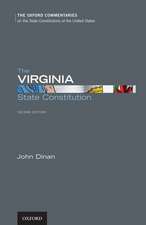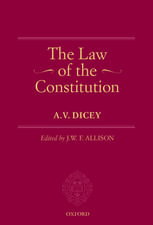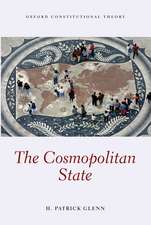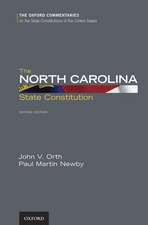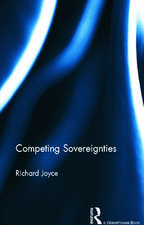Patterns of Constitutional Design: The Role of Citizens and Elites in Constitution-Making
Autor Jonathan Wheatley, Fernando Mendezen Limba Engleză Paperback – 23 noi 2016
| Toate formatele și edițiile | Preț | Express |
|---|---|---|
| Paperback (1) | 489.26 lei 6-8 săpt. | |
| Taylor & Francis – 23 noi 2016 | 489.26 lei 6-8 săpt. | |
| Hardback (1) | 1054.71 lei 6-8 săpt. | |
| Taylor & Francis – 23 aug 2013 | 1054.71 lei 6-8 săpt. |
Preț: 489.26 lei
Nou
Puncte Express: 734
Preț estimativ în valută:
93.63€ • 97.63$ • 77.82£
93.63€ • 97.63$ • 77.82£
Carte tipărită la comandă
Livrare economică 20 martie-03 aprilie
Preluare comenzi: 021 569.72.76
Specificații
ISBN-13: 9781138267190
ISBN-10: 1138267198
Pagini: 208
Dimensiuni: 156 x 234 mm
Greutate: 0.45 kg
Ediția:1
Editura: Taylor & Francis
Colecția Routledge
Locul publicării:Oxford, United Kingdom
ISBN-10: 1138267198
Pagini: 208
Dimensiuni: 156 x 234 mm
Greutate: 0.45 kg
Ediția:1
Editura: Taylor & Francis
Colecția Routledge
Locul publicării:Oxford, United Kingdom
Notă biografică
Dr Jonathan Wheatley is a senior researcher at the Centre for Research on Direct Democracy. He is also lecturer at the University of Zurich and the Swiss Federal Institute of Technology at Zurich. Dr Wheatley's research interests include democratization, state-building, parties and party systems in developing democracies and the impact of new forms of media and information communication technologies on party systems in established democracies. In addition to publishing a number of scholarly articles, Wheatley has also published a book entitled Georgia from National Awakening to Rose Revolution: Delayed Transition in the Former Soviet Union (Ashgate, 2005), Dr Fernando Mendez is a Senior Researcher at the Centre for Research on Direct Democracy and Director of the e-Democracy centre, both based at the University of Zurich. He has been a Lecturer in Political Science on the Masters Programme at the University of Zurich and the Swiss Federal Institute of Technology since 2007. Dr. Mendez holds a PhD in Political Science from the European University Institute, Florence. He has led various projects funded by the Swiss National Science Foundation on aspects of direct democracy and constitutional change. Dr. Mendez's academic interests include direct democracy, comparative federalism, European integration, and comparative public policy.
Recenzii
’In this work, Wheatley and Mendez, and their colleagues, masterfully unpack the inherent tensions between law and politics, and clarify (theoretically and empirically) this crucial dimension of regime change. This is a fundamental work for anyone dealing with the modern yet understudied overlap between direct democracy and constitution-making, or popular rule and constitutional conventions. This is an exciting research, one of the very best on the topic.’ David Altman, Pontificia Universidad Católica de Chile, Chile
Cuprins
Introduction, FernandoMendez, JonathanWheatley; Part 1 Theoretical Framework; Chapter 1 The Constitution-Making Process, FernandoMendez, JonathanWheatley; Chapter 2 Patterns of Constitution-Making over Time and Space, FernandoMendez, JonathanWheatley; Chapter 3 Outcomes of Constitution-Making, JonathanWheatley, MichaGermann; Part 2 Case Studies; Chapter 4 Constitution-Making in West Africa, JonathanWheatley; Chapter 5 Transitions from Above, YaninaWelp; Chapter 6 Legality and Legitimacy, Nina Massüger SánchezSandoval, YaninaWelp; Chapter 7 Constituent Assemblies in Swiss Cantons, AnaTornic, Nina Massüger SánchezSandoval; Chapter 8 Popular Input, Territoriality, and the Constitution-Making Process, FernandoMendez; Chapter 9 Conclusion, JonathanWheatley;
Descriere
Bridging the gap between law and political science this book draws together divergent research on the role of constitution making in conflict resolution, constitutional law and democratization and employs a wide variety of qualitative and quantitative methods to unfold and explore the political frameworks of the states affected. Comparative analysis is used to investigate potential causal chains between constitution-making processes and their outcomes in terms of stability, conflict resolution and democracy. By focusing on both procedure and context, the book explores the impact of constitution-making procedures in new and established states and unions in Europe, South America and Africa.
